Unit 1 Where did you go on vacation-SectionA(GF-3c)课件(共25张PPT)
文档属性
| 名称 | Unit 1 Where did you go on vacation-SectionA(GF-3c)课件(共25张PPT) | 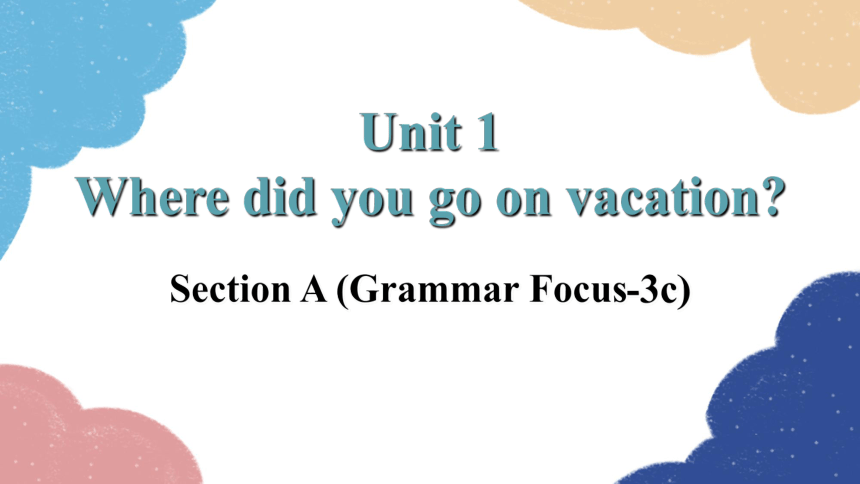 | |
| 格式 | zip | ||
| 文件大小 | 1.9MB | ||
| 资源类型 | 教案 | ||
| 版本资源 | 人教新目标(Go for it)版 | ||
| 科目 | 英语 | ||
| 更新时间 | 2022-10-07 11:02:51 | ||
图片预览

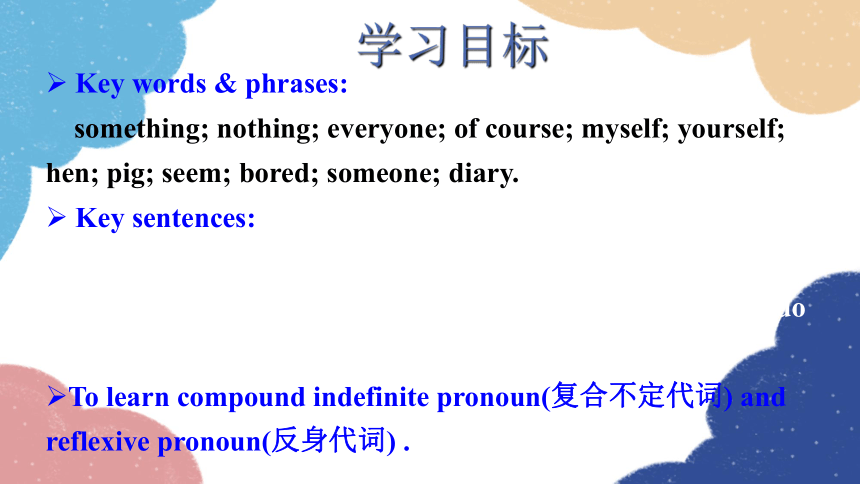


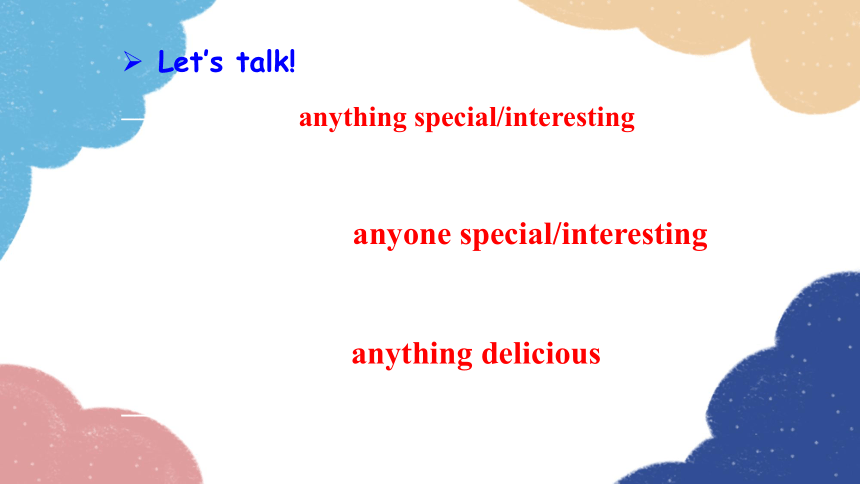
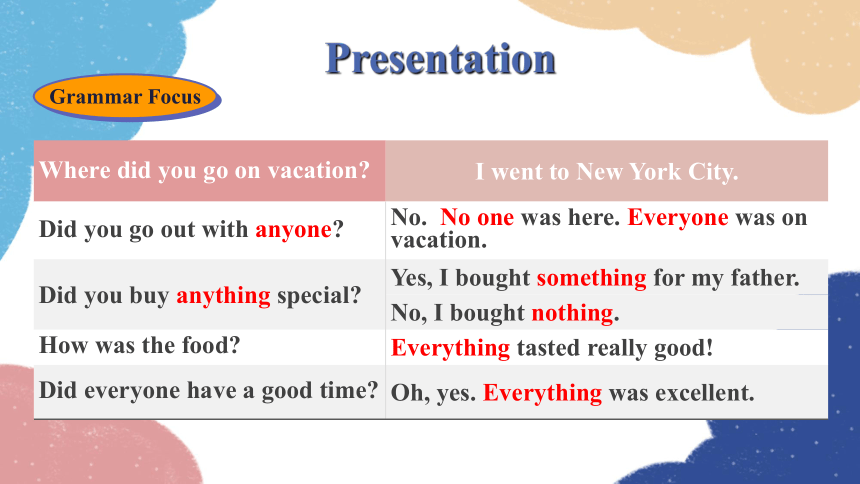
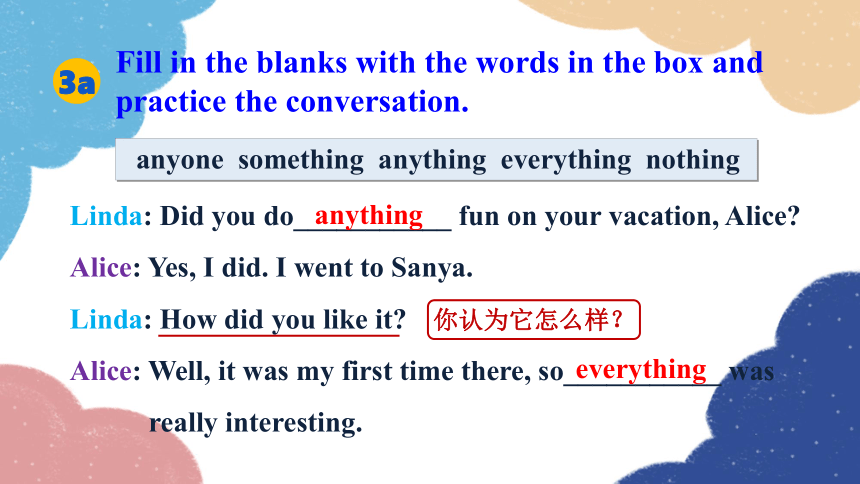
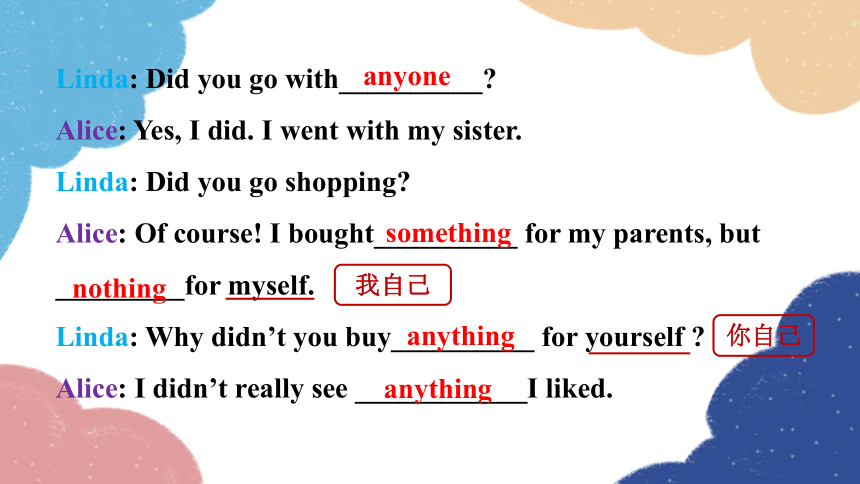
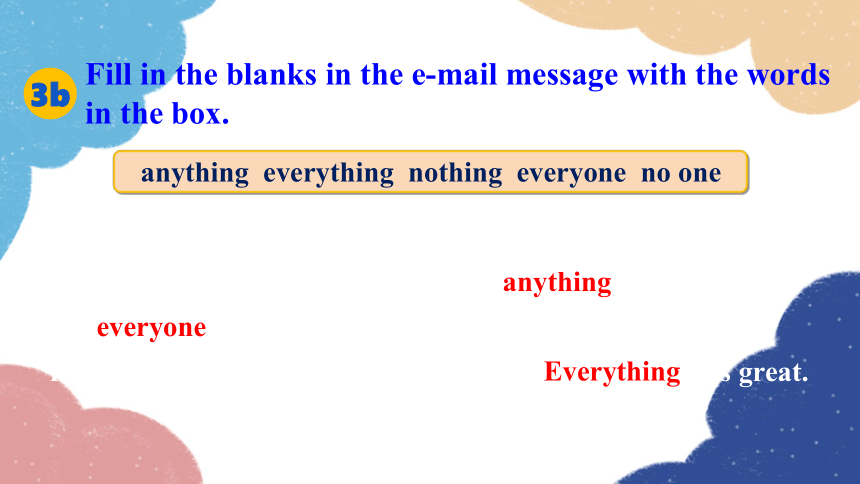
文档简介
(共25张PPT)
Section A (Grammar Focus-3c)
Unit 1
Where did you go on vacation
学习目标
Key words & phrases:
something; nothing; everyone; of course; myself; yourself; hen; pig; seem; bored; someone; diary.
Key sentences:
1. No one was here. Everyone was on vacation.
2. The only problem was that there was nothing much to do in the evening but read. Still no one seemed to be bored.
To learn compound indefinite pronoun(复合不定代词) and reflexive pronoun(反身代词) .
Let’s talk!
— Where did you go on vacation
— I went to…
the Great Wall
countryside
Lead-in
— What did you do
— I …
Let’s talk!
played sports
went hiking
learned swimming
— Did you do anything special/interesting
— I …
Let’s talk!
— Did you meet anyone special/interesting
— I …
— Did you taste anything delicious
— I …
Presentation
Where did you go on vacation I went to New York City.
Did you go out with anyone No. No one was here. Everyone was on vacation.
Did you buy anything special Yes, I bought something for my father.
No, I bought nothing.
How was the food Everything tasted really good!
Did everyone have a good time Oh, yes. Everything was excellent.
Grammar Focus
3a
Fill in the blanks with the words in the box and practice the conversation.
anyone something anything everything nothing
Linda: Did you do___________ fun on your vacation, Alice
Alice: Yes, I did. I went to Sanya.
Linda: How did you like it
Alice: Well, it was my first time there, so___________ was
really interesting.
anything
everything
你认为它怎么样?
Linda: Did you go with__________
Alice: Yes, I did. I went with my sister.
Linda: Did you go shopping
Alice: Of course! I bought__________ for my parents, but _________for myself.
Linda: Why didn’t you buy__________ for yourself
Alice: I didn’t really see ____________I liked.
anyone
something
nothing
anything
anything
我自己
你自己
Fill in the blanks in the e-mail message with the words in the box.
3b
anything everything nothing everyone no one
Dear Bill,
How was your vacation Did you do ________ interesting Did________ in the family go with you I went to a friend’s farm in the countryside with my family. __________was great.
anything
everyone
Everything
We fed some hens and saw some baby pigs. They were so cute! The only problem was that there was __________ much to do in the evening but read. Still __________ seemed to be bored. Bye for now!
Mark
nothing
no one
feed v. 喂养
除了
似乎
3c
Ask your group questions about their last vacation. Then tell the class your results.
Did you… Everyone Someone (write the classmates’name ) No one
eat anything at a restaurant
read anything interesting
visit anyone in your family
buy anything
keep a diary
Group work
In our group, everyone ate something at a restaurant. No one read anything interesting. Li Lei visited his grandparents in the town. Liu Xue bought something interesting. Xu Li kept a diary.
Now work by yourselves. Then give your own report on your group.
Report
Language points
复合不定代词小结:
某人 某事
任何人 任何事
没有人 没有东西
每人 一切
someone
anyone
no one
everyone
somebody
anybody
nobody
everybody
something
anything
nothing
everything
1. some, any, no, every与-one, -thing ,-body可以组成复合不定代词,他们分别是:
2. 复合不定代词用法
(1) some系列的不定代词和some一样主要用于肯定句;
any系列的不定代词和any一样主要用于否定或疑问句。如:There is ___________ wrong with my bike.
我的自行车出毛病了。
I can’t see _______in the classroom.
在教室里我没看见任何人。
something
anyone
不过,在表示请求、建议或征求意见的疑问句中常用some系列的词。
eg. Would you like ___________to drink
你想要一些喝的东西吗?
在表达“任何”这一含义的肯定句中也要用any系列的词。
eg. I think__________ can do it.
我认为任何人都会做。
anyone
something
(2) 修饰复合不定代词something, anyone等的adj , adv, to do不定式等要放在不定代词的后面。如:
Did you meet __________________
你遇见有趣的人了吗?
I have ________ to do today.
我今天没什么事可做。
There’s __________________ in the newspaper today.
今天的报纸里有一些重要的内容。
anyone interesting
nothing
something important
(4) no 系列的不定代词可与not...any 系列的不定代词替换。
eg. I bought nothing.= I______ buy ___________.
我什么也没买。
didn't
anything
(3)这些不定代词作主语时看作单数,谓语动词用单数形式。
eg. Everyone ______ on vacation last weekend.
上周末所有的人都在度假。
was
myself (我自己) ,yourself (你自己)是反身代词。表示“某人自己的词”叫反身代词。见下表:
myself yourself himself herself itself
我自己 你自己 他自己 她自己 它自己
ourselves yourselves themselves
我们自己 你们自己 他们自己
反身代词小结:
1) Did you buy anything for yourself
你为你自己买什么东西了吗 (做介词宾语)
2) The old man taught himself English.
那位老人自学英语。(做动词宾语)
3) The thing itself is not important.
事情本身并不重要。(做同位语)
4) I myself visited my aunt last weekend.
上周我自己去拜访了姑姑。(做同位语)
(注意:反身代词不能单独做主语)
3.How did you like it
句型How ... sb. like ... 与What ... sb. think of ... 同义,意为“某人觉得……怎么样?”。如:
How do you like the TV show
=What do you think of the TV show
你觉得这个电视节目怎么样?
4. Still no one seemed to be bored.
seem意为“好像;似乎;看来”,其主要用法如下:
◆seem+(to be)+adj. 如:
The movie seems (to be) interesting.
这部电影似乎很有趣。
◆seem to do sth. 如:
The boy seems to know nothing about it.
这个男孩似乎对它一无所知。
◆It seems that ... 如:
It seems that Mr. Zhang is at home.
张先生好像在家。
Exercises
汉译英
1. 最近每个人都很忙。
2.— 你假期做什么有趣的事了吗?
— 是的。 我去北京了。
Everyone is very busy these days.
—Did you do anything fun on your vacation
—Yes, I did. I went to Beijing.
3. 你假期过得怎么样?
How was your vacation
4. 晚上没有什么事可做,只好看书。
There was nothing much to do in the evening but read.
5. 我给我父母买了一些礼物,却没给自己买。
I bought some gifts for my parents, but nothing for myself.
Homework
背诵Grammar focus部分。
复习复合不定代词及反身代词的用法。
Section A (Grammar Focus-3c)
Unit 1
Where did you go on vacation
学习目标
Key words & phrases:
something; nothing; everyone; of course; myself; yourself; hen; pig; seem; bored; someone; diary.
Key sentences:
1. No one was here. Everyone was on vacation.
2. The only problem was that there was nothing much to do in the evening but read. Still no one seemed to be bored.
To learn compound indefinite pronoun(复合不定代词) and reflexive pronoun(反身代词) .
Let’s talk!
— Where did you go on vacation
— I went to…
the Great Wall
countryside
Lead-in
— What did you do
— I …
Let’s talk!
played sports
went hiking
learned swimming
— Did you do anything special/interesting
— I …
Let’s talk!
— Did you meet anyone special/interesting
— I …
— Did you taste anything delicious
— I …
Presentation
Where did you go on vacation I went to New York City.
Did you go out with anyone No. No one was here. Everyone was on vacation.
Did you buy anything special Yes, I bought something for my father.
No, I bought nothing.
How was the food Everything tasted really good!
Did everyone have a good time Oh, yes. Everything was excellent.
Grammar Focus
3a
Fill in the blanks with the words in the box and practice the conversation.
anyone something anything everything nothing
Linda: Did you do___________ fun on your vacation, Alice
Alice: Yes, I did. I went to Sanya.
Linda: How did you like it
Alice: Well, it was my first time there, so___________ was
really interesting.
anything
everything
你认为它怎么样?
Linda: Did you go with__________
Alice: Yes, I did. I went with my sister.
Linda: Did you go shopping
Alice: Of course! I bought__________ for my parents, but _________for myself.
Linda: Why didn’t you buy__________ for yourself
Alice: I didn’t really see ____________I liked.
anyone
something
nothing
anything
anything
我自己
你自己
Fill in the blanks in the e-mail message with the words in the box.
3b
anything everything nothing everyone no one
Dear Bill,
How was your vacation Did you do ________ interesting Did________ in the family go with you I went to a friend’s farm in the countryside with my family. __________was great.
anything
everyone
Everything
We fed some hens and saw some baby pigs. They were so cute! The only problem was that there was __________ much to do in the evening but read. Still __________ seemed to be bored. Bye for now!
Mark
nothing
no one
feed v. 喂养
除了
似乎
3c
Ask your group questions about their last vacation. Then tell the class your results.
Did you… Everyone Someone (write the classmates’name ) No one
eat anything at a restaurant
read anything interesting
visit anyone in your family
buy anything
keep a diary
Group work
In our group, everyone ate something at a restaurant. No one read anything interesting. Li Lei visited his grandparents in the town. Liu Xue bought something interesting. Xu Li kept a diary.
Now work by yourselves. Then give your own report on your group.
Report
Language points
复合不定代词小结:
某人 某事
任何人 任何事
没有人 没有东西
每人 一切
someone
anyone
no one
everyone
somebody
anybody
nobody
everybody
something
anything
nothing
everything
1. some, any, no, every与-one, -thing ,-body可以组成复合不定代词,他们分别是:
2. 复合不定代词用法
(1) some系列的不定代词和some一样主要用于肯定句;
any系列的不定代词和any一样主要用于否定或疑问句。如:There is ___________ wrong with my bike.
我的自行车出毛病了。
I can’t see _______in the classroom.
在教室里我没看见任何人。
something
anyone
不过,在表示请求、建议或征求意见的疑问句中常用some系列的词。
eg. Would you like ___________to drink
你想要一些喝的东西吗?
在表达“任何”这一含义的肯定句中也要用any系列的词。
eg. I think__________ can do it.
我认为任何人都会做。
anyone
something
(2) 修饰复合不定代词something, anyone等的adj , adv, to do不定式等要放在不定代词的后面。如:
Did you meet __________________
你遇见有趣的人了吗?
I have ________ to do today.
我今天没什么事可做。
There’s __________________ in the newspaper today.
今天的报纸里有一些重要的内容。
anyone interesting
nothing
something important
(4) no 系列的不定代词可与not...any 系列的不定代词替换。
eg. I bought nothing.= I______ buy ___________.
我什么也没买。
didn't
anything
(3)这些不定代词作主语时看作单数,谓语动词用单数形式。
eg. Everyone ______ on vacation last weekend.
上周末所有的人都在度假。
was
myself (我自己) ,yourself (你自己)是反身代词。表示“某人自己的词”叫反身代词。见下表:
myself yourself himself herself itself
我自己 你自己 他自己 她自己 它自己
ourselves yourselves themselves
我们自己 你们自己 他们自己
反身代词小结:
1) Did you buy anything for yourself
你为你自己买什么东西了吗 (做介词宾语)
2) The old man taught himself English.
那位老人自学英语。(做动词宾语)
3) The thing itself is not important.
事情本身并不重要。(做同位语)
4) I myself visited my aunt last weekend.
上周我自己去拜访了姑姑。(做同位语)
(注意:反身代词不能单独做主语)
3.How did you like it
句型How ... sb. like ... 与What ... sb. think of ... 同义,意为“某人觉得……怎么样?”。如:
How do you like the TV show
=What do you think of the TV show
你觉得这个电视节目怎么样?
4. Still no one seemed to be bored.
seem意为“好像;似乎;看来”,其主要用法如下:
◆seem+(to be)+adj. 如:
The movie seems (to be) interesting.
这部电影似乎很有趣。
◆seem to do sth. 如:
The boy seems to know nothing about it.
这个男孩似乎对它一无所知。
◆It seems that ... 如:
It seems that Mr. Zhang is at home.
张先生好像在家。
Exercises
汉译英
1. 最近每个人都很忙。
2.— 你假期做什么有趣的事了吗?
— 是的。 我去北京了。
Everyone is very busy these days.
—Did you do anything fun on your vacation
—Yes, I did. I went to Beijing.
3. 你假期过得怎么样?
How was your vacation
4. 晚上没有什么事可做,只好看书。
There was nothing much to do in the evening but read.
5. 我给我父母买了一些礼物,却没给自己买。
I bought some gifts for my parents, but nothing for myself.
Homework
背诵Grammar focus部分。
复习复合不定代词及反身代词的用法。
同课章节目录
- Unit 1 Where did you go on vacation?
- Section A
- Section B
- Unit 2 How often do you exercise?
- Section A
- Section B
- Unit 3 I'm more outgoing than my sister.
- Section A
- Section B
- Unit 4 What's the best movie theater?
- Section A
- Section B
- Unit 5 Do you want to watch a game show?
- Section A
- Section B
- Unit 6 I'm going to study computer science.
- Section A
- Section B
- Unit 7 Will people have robots?
- Section A
- Section B
- Unit 8 How do you make a banana milk shake?
- Section A
- Section B
- Unit 9 Can you come to my party?
- Section A
- Section B
- Unit 10 If you go to the party, you'll have a grea
- Section A
- Section B
